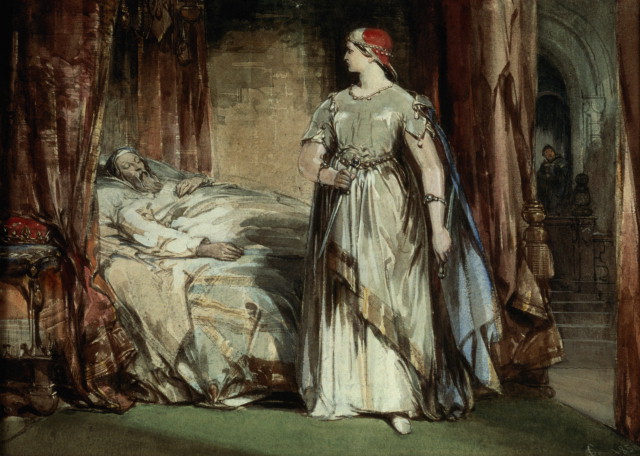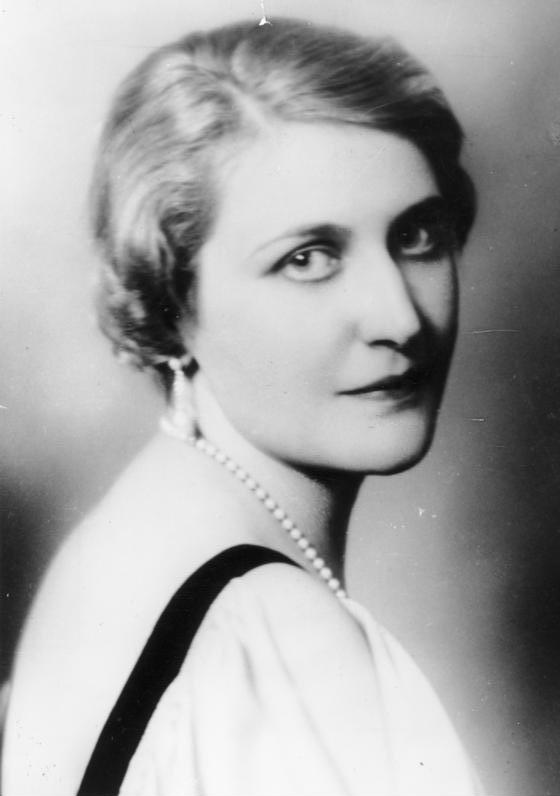by James Wyllie
When I began my account of these women’s lives, people would ask me what I was working on and after I’d explained the general idea behind Nazi Wives, about 90% of them said “oh, they’re like Lady Macbeth.” Any mention of Shakespeare’s iconic character immediately conjures up images of a malevolent woman forcing her husband to perform unspeakable crimes. But how relevant was this comparison to the women I was trying to understand?

This image is in the public domain via Wikicommons.
Approaching this subject, I was determined not to pre-judge these women or impose my own values on them – within reason – or caricature them as “evil” or “monstrous”. Instead, I wanted to unravel them as human beings and expose their complexities and contradictions. It seemed too simplistic, too easy, to fall back on the archetype Shakespeare created. Yet I couldn’t ignore it entirely as it cast a shadow over what I was attempting to achieve.
As I got deeper into the research, however, it became clear that the fundamental, and very significant difference between the Nazi Wives and the doomed Queen was motivation. Lady Macbeth was driven by pure ambition, an unadulterated craving for power. She had no political, moral, or religious quarrel with her beloved King, and though the Nazi Wives wanted their husbands to succeed, they were also motivated by their commitment to Hitler’s ideology, which was more important to them than mere ambition; their unwavering belief in their Führer sustained them through thick and thin. Aside from Emmy Goering – Hermann’s second wife, a successful actress more interested in fame and fortune than politics – all the wives were dedicated, with varying degrees of intensity, to Nazism and Hitler’s psychotic worldview.
Ilse Hess became a believer aged 20 and never abandoned her faith, clinging onto it until her death 75 years later. Lina Heydrich was a Nazi before she met Reinhard and remained one for the rest of her long life. Magda Goebbels had already joined the Nazi party when she encountered her husband. Gerda Bormann’s father was a Nazi, she came to Hitler’s attention when she was a teenager and was married at 19 to a Nazi thug. Carin Goering – Hermann’s first wife – worshipped the ground Hitler walked on. Margaret Himmler may not have held the same extreme views as her husband, but she was a right wing anti-Semite who never once questioned the regime’s policies.
That said, the spectre of Lady Macbeth continued to peer over my shoulder during the writing process; I couldn’t completely banish her from my mind because at various points several of the wives acted in ways that resembled her. At crucial moments in their husbands’ lives, Carin Goering and Lina Heydrich exerted a decisive influence on them, helping them get through troubled times.
After the 1923 Munich Putsch debacle, a wounded Hermann Goering hit rock bottom; a penniless morphine addict on the verge of losing his mind. Throughout, Carin stuck with him, not only getting him the treatment he needed to recover, but also making sure that he remained in Hitler’s thoughts so that when he was fit again he could return back into the fold. It’s no exaggeration to say that without Carin, Hermann would never have risen to the top of the Nazi movement.
Equally well, the teenage Lina Heydrich, just engaged to Reinhard, stood steadfast at his side when he was dismissed from a promising naval career for inappropriate and ungentlemanly conduct. Heydrich was close to falling apart but Lina held him together. She then pushed him in the direction of the Nazis, encouraged him to join the SS and literally put him on the train that took him to an appointment with Himmler which resulted in Reinhard becoming head of SS intelligence. Of course neither of these examples come close to directly equalling the gruesome consequences of Lady Macbeth’s unfettered ambition. However, one of the wives – Magda Goebbels – was more than a match for the tragic Queen; what Lady Macbeth only threatened to do, Magda actually did.

Bundesarchiv, Bild 183-R22014 / CC-BY-SA 3.0
On the night of Duncan’s murder, Macbeth is having second thoughts: given his intended victim is a noble and worthy King, Macbeth would be perpetrating a crime against Nature itself by abandoning his duty to serve and protect his monarch. But Lady Macbeth chides him for his cowardice – “art thou afeard to be the same in thine own act of valour as Thou art in desire?” – telling him that she’d be prepared to brutally violate the sacred bond between mother and child by ripping “the babe that milks me” from her breast and dashing its “brains out”. Ultimately, Lady Macbeth’s chilling pledge is never put to the test, and when the children of one of Macbeth’s rivals are slaughtered she descends into a sleepless madness that leads to her death.
All this bears an eerie resemblance to Magda Goebbels’ decision to murder her children at the end of the war, though we can never be certain whether she administered the poison herself or got someone else to do it. By that stage Magda was a physical and emotional wreck, yet she somehow mustered enough inhuman strength and cold-blooded willpower to carry out what she described in her final letter as the “most difficult task of all”. With this defiant gesture – crowned by her own suicide a few hours later – Magda committed an act more ghastly than anything Shakespeare could have ever imagined.
James Wyllie is an author, award-winning screenwriter and broadcaster. He is the author of Goering and Goering, The Time Traveler’s Handbook, and Codebreakers: The True Story of the Secret Intelligence Team That Changed the Course of the First World War. He has worked on numerous films for the BBC and Film4 and has written for a number of TV drama series.
